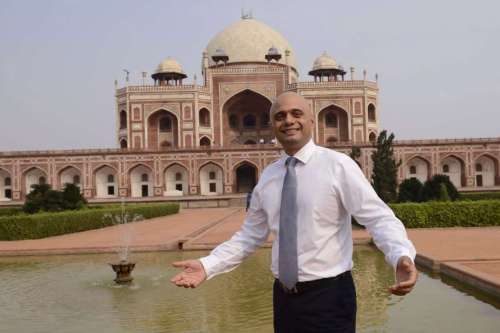Gandhi Statue at Parliament Square within months

India’s Father of the Nation Mahatma Gandhi’s statue would be ready in London’s Parliament Square in the next few months, UK’s Culture Secretary Sajid Javid said at a press conference in New Delhi.
“In the coming months we are going to have a statue of Gandhiji alongside Nelson Mandela. I think it’s a fantastic way to pay tribute to one of the greatest persons to have ever been born on this earth,” said Javid.
He said that they were putting the statue in front of the House of Parliament in London. “We are working with the charity that has been set up to help us with the project,” Javid, whose department is taking care of the project, said.
The putting up of the statue will coincide with the 100th anniversary of Gandhi’s historic return to India from South Africa to start the struggle for self-rule. The Gandhi statue will be the 11th statue to be erected in Parliament Square which already has memorials of international leaders like Mandela, Abraham Lincon and Winston Churchill
In another development, Arts Council England and British Council announced a new £1.5 million lottery fund to build creative connections between the people of England and India.
The fund is part of the programme “Re-Imagine India” that aims to provide English artists and arts organisations with opportunities to develop collaborations and cultural exchanges with their Indian counterparts.
“The scheme will give grants of £15,000-100,000 to support projects which promote creative collaborations, showcase the best of UK and Indian arts across a range of art forms and activity, reach beyond England’s major cities and India’s metropolitans, connect English and Indian artists with diaspora communities in England, build skills and have a real impact and use digital technology,” the Council said in a statement.
Organisations can apply from January 2015 for smaller sums to develop new ideas and explore different partnerships and ways of working, or for larger grants to realise those project ideas and ambitions.
“There will be a second round of funding in 2016 and we expect activity to peak during 2017 to mark the 70th anniversary of Indian independence.”
In addition to the investment by Arts Council England, the British Council has committed £5 million to the programme which runs from 2013-2017.
Arts Council England Chair Sir Peter Bazalgette said: “This programme is an exciting opportunity for artists and cultural organisations to exchange ideas and influences and to make new work together.”
“It will open up opportunities not just for the individual artists involved but also for audiences both here and abroad – we will all see the benefits these cultural exchanges bring to our enriched creative sector,” he added.
The Britain’s Arts Council and British Council also launched a 1.5 million pound fund to build creative connections between the two countries.
Called ‘Re-Imagine India’ the project will provide opportunities for developing collaborations and cultural exchanges through projects showcasing the best of British and Indian arts.
The latest fund is in addition to the 5 million pounds committed by the British Council for the “Re-Imagine Arts” programme that started in 2013.
The project was launched by Javid who also presided over a roundtable on British-India museum partnerships that was attended by representatives from top museums from both the countries.
Speaking on the occasion, Javid stressed on digitisation of the museums as a key area for collaboration.
“There is immense opportunity for cooperation between Indian and British museums. And in this modern age of technology, digitisation is a key area where experts from both countries can cooperate,” he said.
Quoting a survey done by British Council, its director Sujata Sen lamented the lack of digitisation of Indian museums and pointed out to absence of strategies while forging international collaborations.
Her views were echoed by Victorial Memorial curator Jayanta Sengupta and G.S. Rautela of National Council of Science Museums.
Javid, on a four-day visit to India where he is slated to meet several union ministers in Delhi, earlier in the day paid homage to the martyrs of the First World War at the Commonwealth War Graves Cemetery here.
“Whenever we speak of First World War, we should speak of one and a half million men of the Indian army who travelled thousands of miles to bravely fight for a country that was not their own. Thousands of them did not return home.
“The sacrifice of the Indian army deserves to be properly honoured and the British government is determined to make sure that it happens,” he said.
He also said special hand-crafted bronze plaque to honour six Indian soldiers who were awarded Victoria Cross will be unveiled in India later this month.